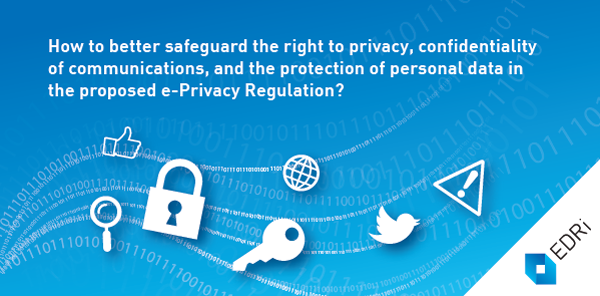EU data protection watchdogs support stronger ePrivacy legislation
On 10 January 2017, the European Commission (EC) published its long-awaited proposal for an e-Privacy Regulation (ePR) to replace the 2002 e-Privacy Directive (ePD). In April 2017, two Opinions were issued to provide comments and recommendations on how to better safeguard the right to privacy, confidentiality of communications, and the protection of personal data in the proposed ePR; one by the Article 29 Data Protection Working Party (WP29), and another one by the European Data Protection Supervisor (EDPS).
Both Opinions share the idea that the EC took the right decision when proposing this legislation. As mentioned by WP29 and the EDPS, the proposal has several positive elements. However, the Council of the European Union and European Parliament now need to focus on fixing the negative aspects that undermine the level of protection accorded by the General Data Protection Regulation (GDPR). The most sensitive issues among the improvements identified by both Opinions are:
Keep definitions in Regulation: Both the EDPS and WP29 share the opinion that the definitions under the ePR could become “moving targets”, if they are imported from the still unfinished European Electronic Communications Code (EECC). WP29 is proposing alternatives, including additional clarifications in the ePR or a simultaneous adoption of both proposals. The EDPS is asking for independent terms, as the definitions created for purposes of economic (market) regulation cannot be expected to be adequate for the protection of fundamental rights.
Privacy by default and by design are essential and not optional: The principle of “privacy by default”, as provided in the GDPR, has been replaced with “privacy by option” in the ePR. This implies that end-users would be given the “option” to determine through software settings whether they allow third parties to access or store information on their devices. Given the inconsistency of this provision with Article 25 of the GDPR, both authorities are proposing to impose an obligation on hardware and software providers to implement default settings that protect end-users’ devices against any unauthorised access to or storage of information on their devices. The EDPS goes even a step further and argues for a provision that would allow users not only be informed about privacy settings during installation or first use of the software, but also at other moments when users make significant changes to their devices or software.
Tearing down “tracking walls”: Tracking walls deny users access to the websites that they are seeking to use, because they do not consent to being tracked across other sites by large numbers of companies. Both Opinions are advising against this possibility to continue allowing tracking walls, with some nuances. While WP29 recommends a weaker solution, the EDPS is asking for a complete and explicit ban on tracking walls. The EDPS argues that according to the GDPR, giving consent has to be a genuinely free choice, and these digital walls cannot result in real consent.
Neither online nor offline tracking: WP29 addresses the issue of offline tracking, and argues that data controllers should, only in limited number of circumstances, “be allowed to process the information emitted by the terminal equipment for the purposes of tracking their physical movements without consent of the individual concerned”. WP29 Opinion also suggests that device tracking should only be permitted if the personal data collected is anonymised. Moreover, the EDPS recommends that the provisions allowing for device tracking be deleted and replaced by a simpler requirement of consent (by all end-users concerned).
Keep an eye on the restrictions: Under the current Directive and the proposed Regulation, non-targeted data retention measures are allowed. Both Opinions re-state that national data retention regimes have to comply with the requirements of the European Union Charter of Fundamental Rights and of the case law of the Court of Justice of the European Union (CJEU), both of which require strict safeguards for mass storage of data.
Give redress to both individuals and organisations: The EC’s proposal leaves the right to collective redress out of the ePR Regulation text, which is puzzling. The EPDS took note of this omission and made it clear that an explicit provision for collective redress and effective remedies (or more simply a reference to Article 80 of the GDPR) are needed. Including such provision is essential to ensure consistency with the GDPR, and to allow individuals to access collective redress through, for example, consumer groups.
WP29: Opinion 01/2017 on the Proposed Regulation for the ePrivacy Regulation (2002/58/EC) (04.04.2017)
http://ec.europa.eu/newsroom/document.cfm?doc_id=44103
EDPS: Opinion 6/2017 on the Proposal for a Regulation on Privacy and Electronic Communications (ePrivacy Regulation) (24.04.2017)
https://edps.europa.eu/sites/edp/files/publication/17-04-24_eprivacy_en.pdf
New e-Privacy rules need improvements to help build trust (09.03.2017)
https://edri.org/new-e-privacy-rules-need-improvements-help-build-trust/
e-Privacy Directive revision: Document pool
https://edri.org/eprivacy-directive-document-pool/
(Contribution by Romina Lupseneanu, EDRi intern)



